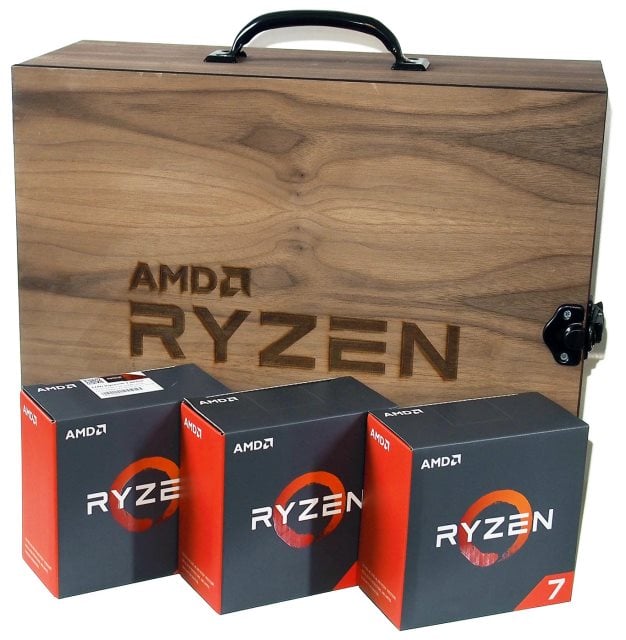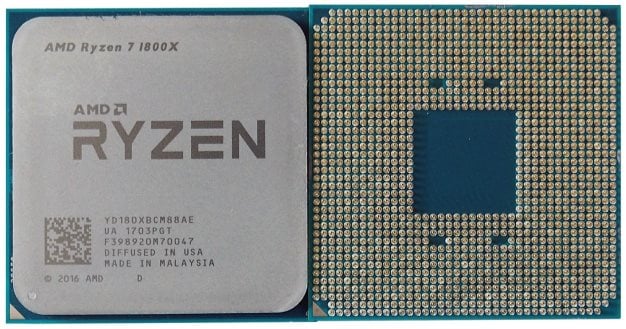AMD Ryzen Review: Ryzen 7 1800X, 1700X, And 1700 - Zen Brings The Fight Back To Intel
AMD Ryzen 7 Series Processor Debut - All You Need To Know
The AMD Ryzen 7 family of processors are finally here. The anxious anticipation for a more powerful competitor to Intel CPUs that has worked many PC enthusiasts into a frenzy -- the likes of which we haven’t seen in over a decade -- has finally come to an end. Today, we can present you all with the independent Ryzen benchmarks and technical details you’ve all been waiting for. Power, performance profiles and overclocking – we’ve got it all on tap.
We’ve had all three of the initial AMD Ryzen 7 series processors in hand for testing, including the flagship Ryzen 7 1800X, the Ryzen 7 1700X, and their low-power cousin the Ryzen 7 1700. At their core, all three of these processors are fundamentally very similar and differ only in their base and turbo-mode clock speeds and support for a couple of features. However, most of you probably know that already, if the engagement on all of the Ryzen-related content we’ve posted as of late is any indicator.

The initial members of the AMD Ryzen 7 series of processors are listed in the table above, along with their main features and specifications. As you can see, their clock speeds differ, and only the X-branded parts offer support for XFR (eXtended Frequency Range), but other than that they’re all similar. And don’t worry, we’ll better explain what all of the acronyms and marketing speak mean a little later.
Ryzen 7 series processors feature 8 CPU cores based on the AMD Zen microarchitecture, with support for 2 threads per core, for a grand total of 16 threads. There’s 16MB of L3 cache on-board and TDPs range from 65 watts for the Ryzen 7 1700 at the low-end, on up to 95 watts for the 1700X and 1800X. In comparison to AMD’s long-standing A-series APUs and FX-series processors, the Ryzen 7-series’ specifications may seem like a downgrade, due to their lower frequencies and TDPs, but rest assured, the new architecture is significantly more efficient and performant than any of AMD’s previous desktop processor offerings.
Ryzen 7 processors (formerly codenamed Summit Ridge) use the brand new AMD socket AM4, which packs in 1,331 pins. Though the processors are totally new, their packaging and physical appearance are reminiscent of the FX-series. Ryzen 7 processors, however, feature distinct Ryzen branding right on their integrate heat spreader and are not compatible with previous AMD chipsets or platforms.
Underneath that heat spreader resides a brand new architecture and processor cores that propel AMD back into the fight with Intel’s latest desktop processors, after years lagging behind Core-series processors. On some levels, AMD has arguably surpassed Intel. For example, though both AMD and Intel built their latest processors with 14nm process technology, AMD’s Zen / Ryzen processors have smaller die areas, at similar core counts, thanks to more compact cache and logic designs.
The new Ryzen 7 series processors include support for a number of additional instructions over previous generation products, as shown in the CPU-Z screen shots above. The processors have 256K of L1 data cache (32K per core), 512K of L1 instruction cache (64K per core), 4MB of L2 cache (512K per core), and 16MB of shared L3 cache. Like all other modern processors, frequencies scale up and down dynamically based on the given workload, with Ryzen 7 1800X topping out in the 4.1GHz range for a single core and 3.7GHz on all cores. CPU-Z data for the other Ryzen 7 series processors looks identical to what you see above, save for the maximum CPU multiplier reported.
We’ve had all three of the initial AMD Ryzen 7 series processors in hand for testing, including the flagship Ryzen 7 1800X, the Ryzen 7 1700X, and their low-power cousin the Ryzen 7 1700. At their core, all three of these processors are fundamentally very similar and differ only in their base and turbo-mode clock speeds and support for a couple of features. However, most of you probably know that already, if the engagement on all of the Ryzen-related content we’ve posted as of late is any indicator.

So, instead of giving you more backstory here, we’re going to keep things succinct and just get down to business. One of the most anticipated PC components products in recent memory has shipped. And it’s time for the full monty. Strap yourself in and get comfy folks – we’ve got a lot to cover...
|
The initial members of the AMD Ryzen 7 series of processors are listed in the table above, along with their main features and specifications. As you can see, their clock speeds differ, and only the X-branded parts offer support for XFR (eXtended Frequency Range), but other than that they’re all similar. And don’t worry, we’ll better explain what all of the acronyms and marketing speak mean a little later.
Ryzen 7 series processors feature 8 CPU cores based on the AMD Zen microarchitecture, with support for 2 threads per core, for a grand total of 16 threads. There’s 16MB of L3 cache on-board and TDPs range from 65 watts for the Ryzen 7 1700 at the low-end, on up to 95 watts for the 1700X and 1800X. In comparison to AMD’s long-standing A-series APUs and FX-series processors, the Ryzen 7-series’ specifications may seem like a downgrade, due to their lower frequencies and TDPs, but rest assured, the new architecture is significantly more efficient and performant than any of AMD’s previous desktop processor offerings.
Ryzen 7 processors (formerly codenamed Summit Ridge) use the brand new AMD socket AM4, which packs in 1,331 pins. Though the processors are totally new, their packaging and physical appearance are reminiscent of the FX-series. Ryzen 7 processors, however, feature distinct Ryzen branding right on their integrate heat spreader and are not compatible with previous AMD chipsets or platforms.
Underneath that heat spreader resides a brand new architecture and processor cores that propel AMD back into the fight with Intel’s latest desktop processors, after years lagging behind Core-series processors. On some levels, AMD has arguably surpassed Intel. For example, though both AMD and Intel built their latest processors with 14nm process technology, AMD’s Zen / Ryzen processors have smaller die areas, at similar core counts, thanks to more compact cache and logic designs.
The new Ryzen 7 series processors include support for a number of additional instructions over previous generation products, as shown in the CPU-Z screen shots above. The processors have 256K of L1 data cache (32K per core), 512K of L1 instruction cache (64K per core), 4MB of L2 cache (512K per core), and 16MB of shared L3 cache. Like all other modern processors, frequencies scale up and down dynamically based on the given workload, with Ryzen 7 1800X topping out in the 4.1GHz range for a single core and 3.7GHz on all cores. CPU-Z data for the other Ryzen 7 series processors looks identical to what you see above, save for the maximum CPU multiplier reported.












